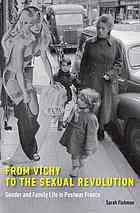Product desciption
From Vichy To The Sexual Revolution Gender And Family Life In Postwar France Sarah Fishman by Sarah Fishman 9780190248628, 0190248629 instant download after payment.
At the end of World War II, the vast majority of people in France, living in small towns or rural areas, had suffered through a series of traumas-economic depression, war and occupation, the absence of millions of POWs, deportees and forced laborers, widespread destruction. The resulting disruptions continued to reverberate in families for several years after the Liberation. In the decades following the war, France experienced radical economic and social transformations, becoming an urban, industrial, affluent nation. In less than thirty years, French ideas about gender and family life underwent dramatic changes. This book provides a broad view of changing lives and ideas about love, courtship, marriage, giving birth, parenting, childhood, and adolescence in France from the Vichy regime to the sexual revolution of 1960s. To understand how such changes influenced ideas about family life, From Vichy to the Sexual Revolution explores inexpensive guide books on marriage, childbirth and parenting, advice columns and popular magazines directed at readers from a variety of backgrounds. Sarah Fishman puts these sources into context, by exploring juvenile court family case studies. 0She links economic and social changes to the evolution of thinking about gender, the self, and the family, throwing new light on the emergence of a new vision of the family, one based on dynamic relationships rather than a set structure.
Abstract: At the end of World War II, the vast majority of people in France, living in small towns or rural areas, had suffered through a series of traumas-economic depression, war and occupation, the absence of millions of POWs, deportees and forced laborers, widespread destruction. The resulting disruptions continued to reverberate in families for several years after the Liberation. In the decades following the war, France experienced radical economic and social transformations, becoming an urban, industrial, affluent nation. In less than thirty years, French ideas about gender and family life underwent dramatic changes. This book provides a broad view of changing lives and ideas about love, courtship, marriage, giving birth, parenting, childhood, and adolescence in France from the Vichy regime to the sexual revolution of 1960s. To understand how such changes influenced ideas about family life, From Vichy to the Sexual Revolution explores inexpensive guide books on marriage, childbirth and parenting, advice columns and popular magazines directed at readers from a variety of backgrounds. Sarah Fishman puts these sources into context, by exploring juvenile court family case studies. 0She links economic and social changes to the evolution of thinking about gender, the self, and the family, throwing new light on the emergence of a new vision of the family, one based on dynamic relationships rather than a set structure


